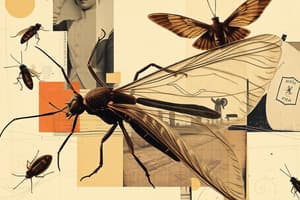Podcast
Questions and Answers
What impact do pests have on fish ponds?
What impact do pests have on fish ponds?
- They serve as a food source for fish.
- They compete for resources needed by fish. (correct)
- They contribute to oxygen production in the pond.
- They enhance the growth of desirable plants.
Which method is recommended to control predators in a fish pond?
Which method is recommended to control predators in a fish pond?
- Pond poisoning or pesticide application. (correct)
- Applying pesticides randomly without guidelines.
- Only using mechanical removal methods.
- Allowing natural predators to balance the ecosystem.
What type of pesticides are preferred due to their environmental safety?
What type of pesticides are preferred due to their environmental safety?
- Pesticides that are applied in high concentrations.
- Organic pesticides that are biodegradable. (correct)
- Pesticides that are only effective for short durations.
- Chemical pesticides that are non-biodegradable.
When should chemical methods of control be used for predators?
When should chemical methods of control be used for predators?
What is one advantage of fine-weave netting in pest control?
What is one advantage of fine-weave netting in pest control?
Why is draining the pond recommended for predator control?
Why is draining the pond recommended for predator control?
What precaution should be taken when using pesticides in a pond?
What precaution should be taken when using pesticides in a pond?
What role does fencing play in managing pond predators?
What role does fencing play in managing pond predators?
What is a drawback of non-biodegradable pesticides?
What is a drawback of non-biodegradable pesticides?
What is a potential method for immediate detection of predators?
What is a potential method for immediate detection of predators?
Study Notes
Pest and Predator Control in Nursery Ponds
- Definition of Pest: A detrimental plant or animal impacting human concerns such as crops and livestock. In pond ecosystems, pests compete for resources like feed, dissolved oxygen, and other nutrients critical for fish growth.
- Definition of Predator: An animal that hunts, kills, and consumes other animals within the pond ecosystem.
Methods for Controlling Predators
- Pond Poisoning:
- Application of pesticides by spraying the pond bottom in at least 0.5 to 1.0 feet of water is common for total elimination of predators.
- Avoid applying poison to a drained pond to prevent residue adhering to the soil, complicating future cleaning efforts.
- Types of Pesticides:
- Organic: Environmentally friendly alternatives.
- Chemical: Divided into
- Biodegradable
- Non-biodegradable
Mechanical Removal Techniques
- Draining and Drying: Effective method to eliminate predators. Allows freshwater species buried in mud to resurface after letting water in and draining it out after a few days.
- Screened Gates: Installation of gates to block predators and unwanted fish species from entering the pond.
Chemical Methods
- Pesticide Usage: Should only be used after physical methods fail or when conditions prevent thorough drying of the pond.
- Preference for Organic Pesticides: Recommended due to their biodegradable nature; ensure to read and follow container instructions for safety.
Additional Predator Control Techniques
- Fine-Weave Netting: Acts as a physical barrier to deter snakes and protect fish from predation.
- Fences: Physical barriers around the pond to prevent animal entry.
- Fishstock Guardians: Individuals assigned to monitor and protect the fish.
- PIR Sensors: Use sensors to detect unwelcome arrivals, triggering appropriate responses.
Studying That Suits You
Use AI to generate personalized quizzes and flashcards to suit your learning preferences.
Related Documents
Description
This quiz focuses on the definitions and control methods of pests and predators in nursery ponds. Learn about various pesticide types and mechanical removal techniques that help maintain a healthy pond ecosystem. Test your knowledge on effective pest management strategies.




